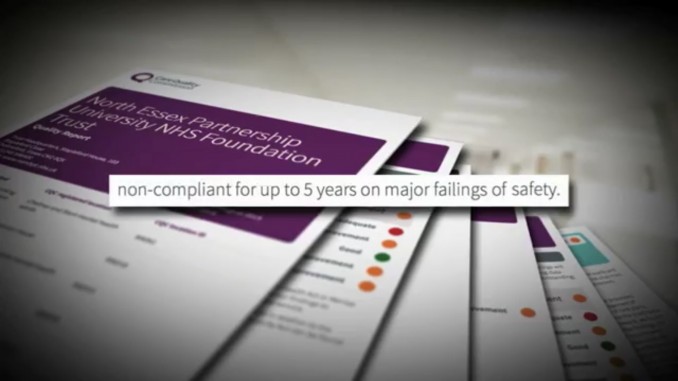
England’s Chief Inspector of Hospitals has rated the services provided by North Essex Partnership NHS Foundation Trust as Requires Improvement following an inspection by the Care Quality Commission.
The CQC inspected the core services provided by North Essex Partnership NHS Foundation Trust between 24 and 28 August 2015. The trust provides mental health services across North Essex. The services provided by the trust are used by children and adolescents, young adults, acute adults, older adults and adult rehabilitation.
A team of inspectors, which included a variety of specialists and experts by experience visited hospital wards and community based mental health services.
Full reports including ratings for all of the provider’s core services are available at: www.cqc.org.uk/provider/RRD.
The CQC has rated the trust as Requires Improvement overall. It was rated as Good for being caring, Requires Improvement for being responsive, effective and well led and rated Inadequate for being safe.
CQC’s Deputy Chief Inspector of Hospitals (and lead for mental health), Dr Paul Lelliott, said:
“Our inspectors found the trust must make a number of improvements to bring its services overall up to a level that would earn a rating of Good overall. We gave immediate feedback to the trust following the inspection and this report presents the detail of our findings, our ratings and our recommendations.
“In particular, we were concerned that staff in some services were not always following best practice in assessing mental capacity and obtaining consent. They were also not involving the patient sufficiently in the planning of their care. Staff sometimes failed to make patients aware of their legal rights and there was a lack of occupational therapy or other specialised day activities.
“Trust managers took a long time to make improvements to services, including those necessary to assure that patients were safe. Changes took a long time to implement and consultations on improvements were not given the urgency necessary to give confidence that matters would be resolved. For example, they had identified the need to make changes to wards to remove fixtures and fittings that might put patients at risk but had had not yet undertaken the work. Ligature-free doors had not been installed or even commissioned despite these having been agreed some time ago. There were still an unacceptable number of ligature risks identified during the inspection.
“Over the past five years, CQC inspectors, along with Mental Health Act reviewers, have inspected this trust several times. Each time we have identified problems that the trust needed to address; for example regarding safety at both the Linden Centre and the Lakes locations. Each time the trust had given assurances and then has not done so.
“Despite these concerns, we also found a number of areas of good practice across North Essex Partnership NHS Foundation Trust. The trust spent two years planning and consulting for the community transformation programme which started in April 2015. Patients confirmed that these changes had led to improved community mental health care and treatment delivery by the trust.
“We found some good examples of positive multidisciplinary work, met staff who were supporting patients well and heard positive feedback from patients and carers.
“The trust leadership knows what it needs to do to bring about improvement in the areas identified and our inspectors will return at a later date to check on what progress has been made.”
The CQC has told the trust to take action in several areas, including:
The trust must ensure that action is taken to remove ligatures risks.
The trust must comply with Department of Health guidance in relation to mixed sex accommodation.
There must always be sufficient experienced staff on duty at all times to provide skilled care to meet patients’ needs.
The trust must ensure that medical equipment is working effectively and stored appropriately.
The trust must have effective systems in place for the safe prescribing and administration of medication.
The trust must carry out assessments of each patient’s mental capacity where concerns have been identified and record these in the care records.
The security of the doors within Edward House must be addressed.


Leave a Reply
You must be logged in to post a comment.